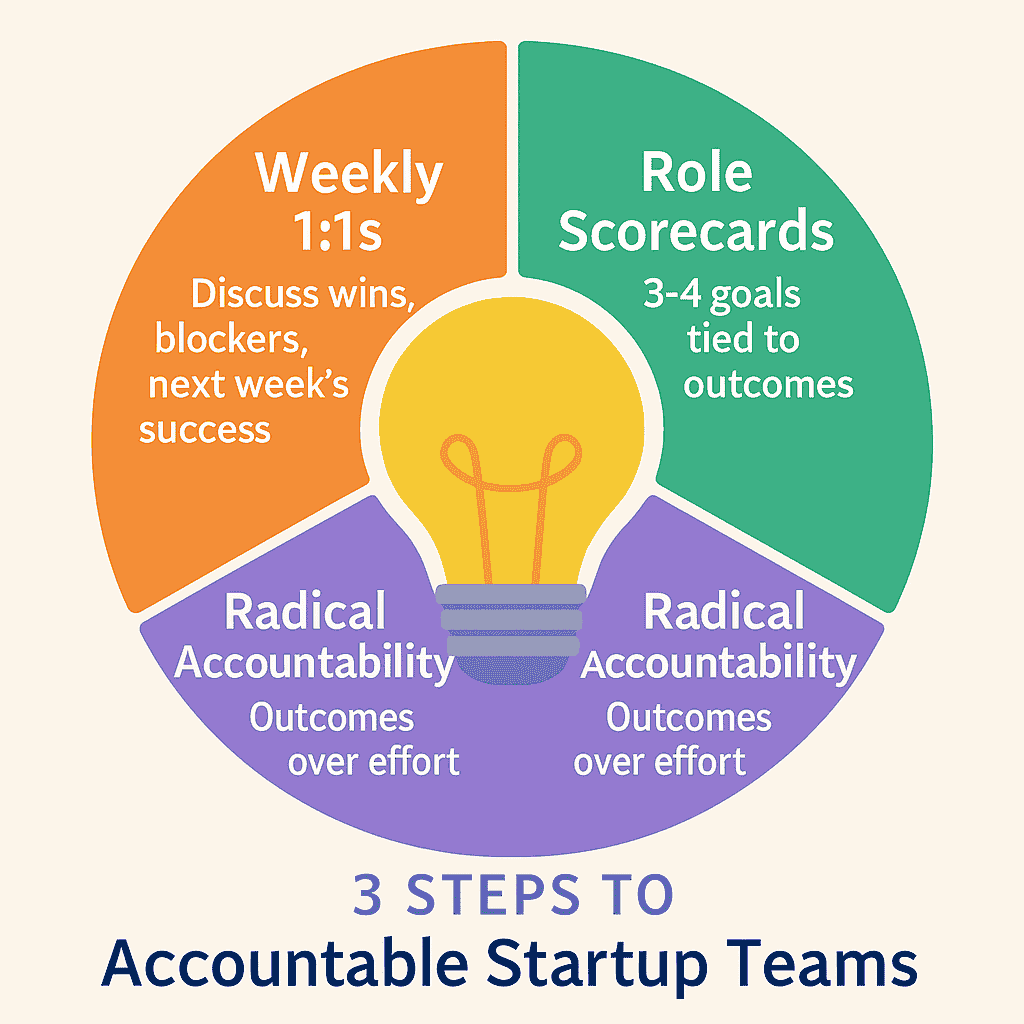TL;DR – The Best Way to Hold Your Startup Team Accountable
-
Most startups struggle with accountability because they avoid hard conversations or overcomplicate the process.
-
The best way to hold your startup team accountable is a simple 3-step system:
-
Weekly 1:1s (30 min): Wins, blockers, next week’s success.
-
Role Scorecards: 3-4 big, measurable goals tied to real business outcomes.
-
Radical Accountability: Outcomes over effort. Real-time feedback. No sugarcoating.
-
Accountability is the founder’s job—no one else will drive it if you don’t.
Let’s get real. The best way to hold your startup team accountable isn’t another dashboard, a fancy HR tool, or more meetings. It’s a simple system that creates clarity, drives outcomes, and builds a culture where results actually matter.
If you’re running a startup or scale-up, especially at Series A to C with 5 to 200 employees, this is the playbook you need. Headquartered in Bellevue, WA, with an office in Boulder, CO, we provide scalable, Fractional COO and operational efficiency solutions to startups and bootstrapped businesses nationwide. We’ve seen firsthand what happens when founders avoid accountability.
Here’s the truth: Companies with solid performance systems are 4.2x more likely to outperform competitors, with 30% higher revenue growth and 5% lower attrition rates. Yet most startups drift, patching problems as they go, hoping the team will figure it out. Hope is not a strategy.
Why Most Founders Struggle to Hold Teams Accountable
Founders are natural builders. They move fast, think big, and focus on the product. However, when it comes to holding teams accountable, most either overcomplicate the process or avoid it altogether.
You don’t need a 12-step framework or an army of HR specialists. You need a system that gets results. The best way to hold your startup team accountable is to make it simple, straightforward, and relentless.
The 3-Step Playbook: Best Way to Hold Your Startup Team Accountable
1. Weekly 1:1s (30 minutes, max)
Most managers skip this because they think they’re too busy. That’s the first mistake. A weekly 1:1 is your core feedback loop, and a form of microfeedback where smaller feedback exchanges will continue, supported by technology that makes these interactions easier to capture and analyze. Without it, you’re running blind.
Keep it simple:
-
Wins: What went well this week?
-
Blockers: What’s in the way?
-
Next Week’s Success: What does success look like for the next 7 days?
Example: In a sales team 1:1, the AE and manager meet every Tuesday at 9am. The AE reports that she booked 12 meetings last week. Blocker: New outbound sequence not fully loaded in Sales Engagement Platform (SEP). Close three open deals.
This is how you build momentum every single week.
2. Role Scorecards (3-4 goals, max)
Forget job descriptions. They’re vague and outdated. Every key role in your startup needs a scorecard—3 to 4 big, measurable goals tied directly to outcomes.
Here’s how:
-
Pick outcomes, not activities. Instead of “manage social media,” make it “generate 1,200 qualified leads per month.”
-
Make it public. Everyone knows what others are accountable for.
-
Assign ownership. No shared accountability. One owner per goal.
Example:
Your Head of Marketing’s scorecard might look like this:
-
LEADS: Generate 1,200 qualified leads per month — Last month: 1050 (Yellow)
-
CAMPAIGNS: Launch 4 new campaigns per month — Last month: 2 (Red)
-
CONVERSION: Achieve 5% Marketing Captured Lead to Qualified Opportunity – Last Month: 5.2% (Green)
Scorecards tell the truth. They cut through the noise. That’s how you drive performance at scale. The best way to hold your startup team accountable is to make the numbers visible and the outcomes non-negotiable.
3. Radical Accountability (Outcomes > Effort)
Startups don’t have time for fluff. You’re either hitting outcomes or you’re not. Radical accountability means:
-
Holding the line on results, not intentions.
-
Giving feedback in real time. No feedback, sandwiches, or delayed reviews.
-
Owning tough conversations. If someone’s not performing, say it.
Example: A product manager misses two sprints in a row. The founder sits down and says, “We agreed on these deliverables. They weren’t shipped. What’s the plan to get this back on track this week?” No blaming. No waiting. Just action. That’s radical accountability.
Most founders shy away from this. Don’t. You set the tone. The best way to hold your startup team accountable is to lead by example. No excuses. No exceptions.
The Founder’s Role in Accountability
Let’s be clear. Performance systems don’t run themselves. As a founder, you are the system.
Your job is to:
-
Model accountability. Show up to 1:1s. Follow the scorecards. Have the tough conversations.
-
Make it simple. If it feels too complex, it won’t stick.
-
Tie it back to outcomes. Every conversation should connect to your business goals: revenue, growth, and retention.
Skip this, and you’ll build a culture of excuses and drift. Nail it, and you’ll build a high-velocity, accountable team that can scale fast.
Want to see how we help founders implement this? Let’s jam. You’ll leave with a practical step you can take this week to tighten up your team’s accountability system.
What to Do This Week
Here’s your action plan:
-
Tighten up weekly 1:1s for all managers. Use the wins/blockers/next week’s success format.
-
Draft role scorecards for every key role. Limit to 3-4 goals. Tie them to real outcomes. For early-stage companies, keep them exceptionally tight categorically across the company. Example:
- Revenue
- Customer Delivery
- Cash
-
Have the tough conversations. Where are you letting mediocrity slide? Fix it this week.
The best way to hold your startup team accountable is to stop waiting for things to improve and start driving a system that works magically.
Your team’s performance is the ceiling for your growth. Build a system that raises the bar every week.
